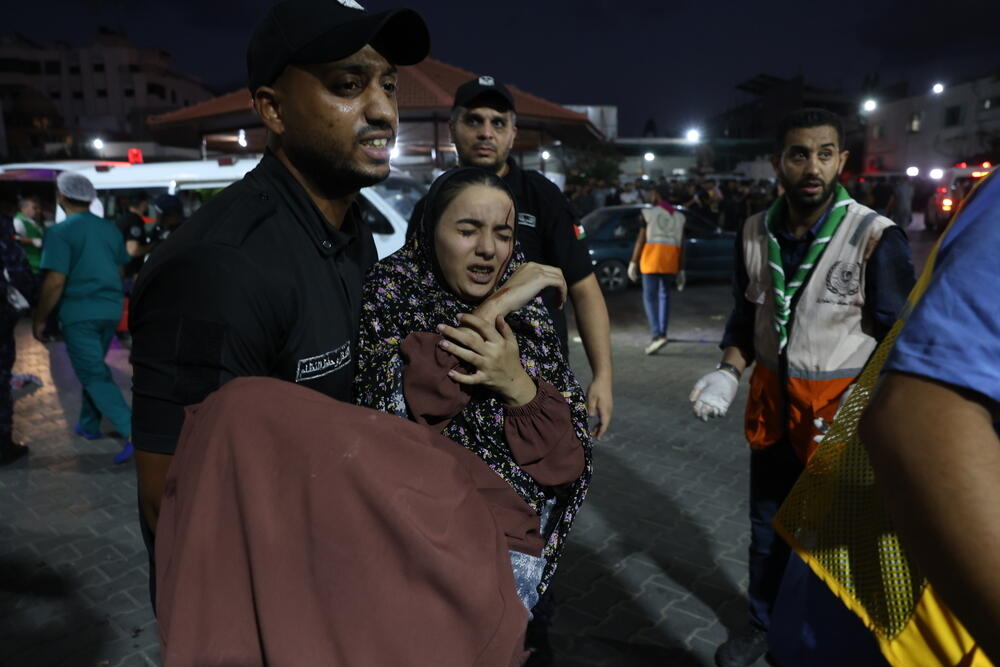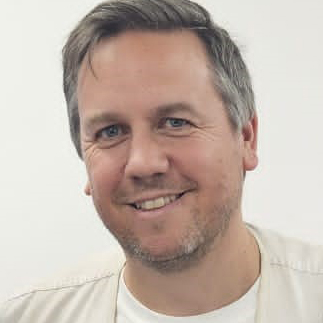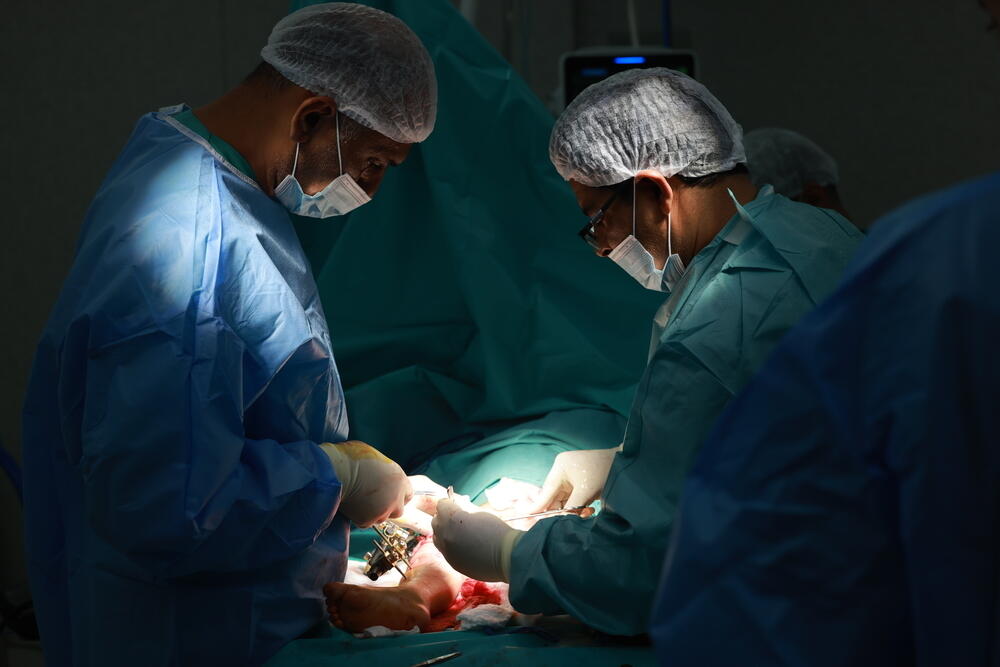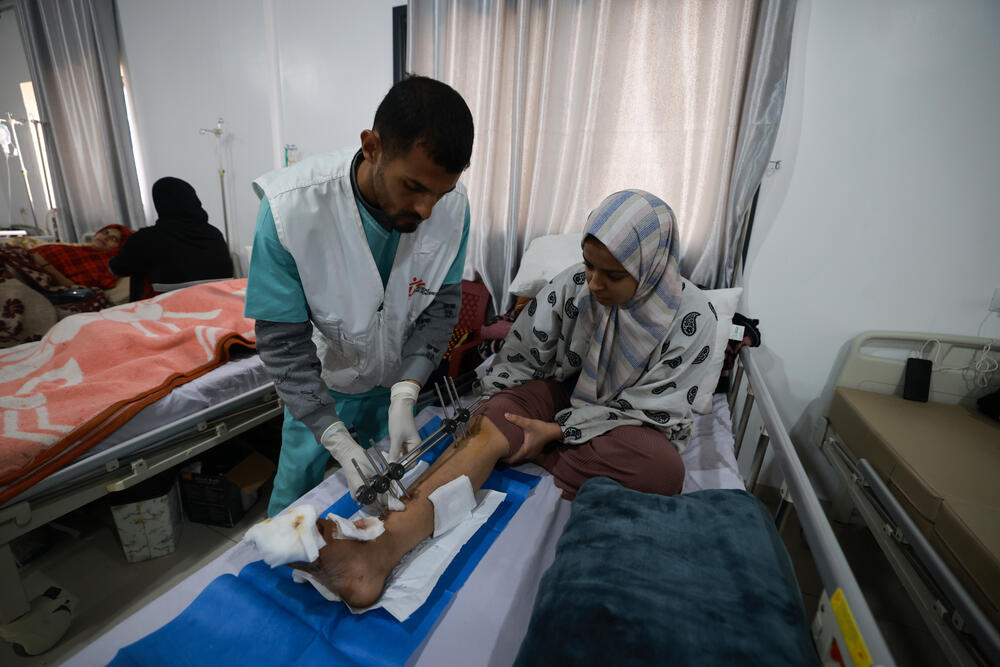Gaza: "What’s happening now is the most brutal thing I have witnessed in my career"
Overwhelmed wards. Difficult decisions. Inspiration in the impossible. Dr Chris Hook returns from Nasser Hospital in Gaza, where he joined teams working under extreme pressure to provide life-saving care.
Here, the Médecins Sans Frontières / Doctors Without Borders (MSF) medical team leader shares his powerful testimony from the frontline of a humanitarian catastrophe.
Update: Since Chris returned from Gaza, Nasser Hospital has been forced out of action
Explained: How the Israeli army attacked Gaza's Nasser Hospital
By the time we arrived in Gaza on 14 November 2023, it had been five weeks since the escalation of the conflict. Bombing had been intensive, Gaza City and the north had been cut off, and hundreds of thousands of people had been forced to leave their homes and head south.
We went straight to Nasser Hospital in the city of Khan Yunis, in the south of the Strip, a hospital where Médecins Sans Frontières / Doctors Without Borders (MSF) had worked before.
Our initial goal was to support with surgical capacity.
"The emergency department is immediately full of people. There aren’t enough beds, so patients are treated on the floor, which quickly becomes covered in blood"
Overwhelming numbers of patients were arriving regularly at the hospital with severe burns and traumatic injuries. Some came in trucks with seven or eight people loaded in the back, some injured, some already dead. Others were brought in by their families, rushed in from cars, carried by brave bystanders determined to help.
Our international team included three surgeons and two anaesthetists, as well as ICU and emergency medicine specialists and other key roles. Whilst we had just arrived, we were joining Palestinian colleagues who have been at the forefront of this crisis from the start.
Nasser Hospital has a building where MSF has previously run a service treating bone infection.
The building has two operating theatres, but when we arrived the immense pressures on the hospital staff meant they were only able to have one running, and only intermittently. With our team and resources we were able to work together with the hospital staff and open both operating theatres.
Many of the patients need orthopaedic surgery to fix broken bones, and then plastics: a surgery to treat wounds that are too large to be closed with stitches alone.
In plastic surgery a specialist surgeon will move tissue from another part of the body to cover the wound, maintaining a blood supply to keep the tissue alive. The team also performed many skin grafts, often as treatment for severe burns.
Mass casualty incidents
“All doctors! All doctors to the emergency department!”
The emergency department is immediately full of people. There aren’t enough beds, so patients are treated on the floor, which quickly becomes covered in blood. Sometimes there aren’t enough medications, especially if it’s the fourth or fifth bombing of the day.
There’s no quiet space to take people whose injuries are not survivable, nowhere to gently explain to their families what is happening.
Amid the crowds, doctors make incredibly difficult decisions about who to treat with the resources available.
"We were cut off from our warehouse of medical supplies after the region was declared an evacuation zone, surrounded by troops"
I remember one girl in particular – around 11 years old. There had been a direct hit on her house, but somehow she had been pulled out of the rubble. None of her family had survived.
She had extensive injuries, but the team managed to resuscitate her.
A CT scan showed she had severe lung contusions – essentially bruising that causes blood and other fluid to build up on the lungs and can stop them functioning. Thankfully the ICU team were able to stabilise her and put her on a ventilator – a machine to help her breathe.
We knew that if she survived she would need multiple surgeries.
The damage to her lungs meant the eleven-year-old was on a ventilator for several days. But, with the care of the ICU team, she was eventually stable enough for surgery.
She had several large wounds, extensive burns and a broken leg. It’s hard to imagine the pain and fear she must have experienced, despite the efforts of the team. She needed plastics, orthopaedics and skin grafts – a huge amount of surgery for anyone, but especially a child on her own.
While she was being treated, the cycle continued in the emergency department, with waves of injured people arriving and exhausted staff doing everything they could.
We do what we can
During this time I was working on finding new spaces for MSF to work. With so many people displaced from the north, the hospitals in the Middle Area and south of Gaza were overwhelmed.
After a lot of work, we opened a clinic to the south of Nasser, only for it to be closed a few days later when the road was cut off by tanks and a nearby airstrike signalled a new phase of military movements in the area.
This road closure also meant our MSF colleagues in Al Aqsa Hospital in the Middle Area were isolated; remarkably, some of them chose to stay. The east of Khan Yunis came under attack, so the staff and patients at Nasser Hospital were also much less safe. We were cut off from our warehouse of medical supplies after the region was declared an evacuation zone, surrounded by troops.
The security situation in Gaza and the lack of humanitarian access means that MSF is not able to work as we normally would. In these circumstances, it’s important to focus on what we can achieve.

Help us prepare for the next emergency
In the three weeks it was operational, our surgery project meant Nasser hospital went from around eight plastic surgeries a day to just over 20. Our teams there supported the emergency and ICU departments to care for patients through multiple major mass casualty incidents a day – in my hospital in the UK we might not see one in a year.
After careful negotiation, we were able to move the supplies to a new warehouse, meaning our teams in the south still have some access to the medications and materials they need to care for patients.
And just before I left, we were able to open a new field hospital in Rafah. It has a clinic providing outpatient wound care, physiotherapy and mental health services, and 60 beds for more critical care. This isn’t an exhaustive list of what MSF’s work in Gaza – just the things I got to be part of or see first-hand.
The most inspiring thing
That healthcare is functioning at all in Gaza is thanks to our Gazan colleagues: both the 300+ who are part of MSF and the many other Gazan health workers with whom we work closely.
We have colleagues who have escaped bombing in three or four different cities, trying each time to find somewhere safe for their families. But we opened the new field hospital in Rafah and there they were, asking what can we do? How can we help?
"What this little girl needs is what everyone in Gaza needs right now: a ceasefire"
Most have lost family members, they’ve lost their homes. Some are living in tents with limited access to toilets, they can struggle to find food. Some have been besieged, they’ve seen colleagues killed in convoys of MSF cars, they worry about their families every time they leave them to come to work.
But they keep turning up. They keep treating patients, even when there is a threat to their own lives. Even though they are exhausted and burnt out. And they find moments of humour and positivity among it all.
The situation in Gaza is brutal, and what Gazan health workers are doing is one of the most inspiring things I have ever witnessed.
After she’d been in hospital for around five days, the girl’s extended family found her. They had heard that there might have been a survivor from the shelling and had started to search. She recovered well from the surgeries, and we were able to discharge her to their care, with an external fixator on her lower leg.
We don’t know what will happen to her next...
The area around Nasser Hospital, where she was treated, has been declared an evacuation zone. Her external fixator, which is a metal frame holding her fractured bone in place, will be a risk for infection unless she’s able to access appropriate follow-up care.
What this little girl needs is what everyone in Gaza needs right now: a ceasefire.
The violence needs to stop. We need improved humanitarian access, and more staff, medications and supplies. People need more food, water, blankets, shelter – everything. They need to be able to return to and rebuild their homes. The humanitarian situation is urgent and the medical consequences of this conflict will be felt for years to come.
What’s happening now in Gaza is without a doubt, the most brutal thing I have witnessed in my career. It must stop now.
MSF and the Gaza genocide
We are witnessing Israel commit genocide in Gaza.
MSF teams have seen firsthand the campaign of ethnic cleansing of Palestinians being pursued by the Israeli military in Gaza. The UK Government is complicit in these atrocities.
Our staff have worked to treat the wounded and supply overwhelmed hospitals as indiscriminate attacks and a state of siege threaten millions of men, women and children.



